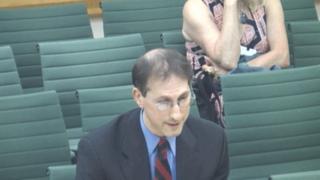 Image copyright
Image copyright
Parliament live TV
Aaron Greenspan has been an outspoken critic of Facebook
A Harvard contemporary of Mark Zuckerberg has launched a stinging attack on both Facebook and its founder, in testimony to UK MPs.
Aaron Greenspan, who claims to have come up with the idea for Facebook first, has been a long-standing critic.
He told MPs that he believed the number of fake accounts on the platform to be far higher than Facebook admitted.
Facebook has previously dismissed his claims but had no comment on his appearance in Westminster.
‘Privacy nightmare’
Mr Greenspan told MPs he had developed a portal for students, to unite various campuses at Harvard, called houseSYSTEM but also referred to as The Facebook, in 2003.
And, in 2004, when the idea was still to use it for students only, he had warned Mr Zuckerberg that such a portal could become “a privacy nightmare”.
“Mark clearly disregarded that sentiment,” he told MPs.
“In the early days, [Facebook] lost control of the platform and it will never get it back.”
Fake accounts
The Digital Culture Media and Sport Sub-committee on Disinformation is currently scrutinising social media and how it could be regulated.
Damian Collins, who chairs the committee, has frequently called on Mr Zuckerberg to come to Parliament to answer questions about how Facebook operates – but he has refused.
The company says 5% of its monthly active users are fake.
And its latest transparency report says it removed more than three billion fake accounts between October 2018 and March 2019, the vast majority of which had been detected within minutes of being created.
Chernobyl disaster
But Mr Greenspan, who won an undisclosed amount from Facebook in a dispute about patent and trademarks 10 years ago, told the sub-committee: “The way these estimates are arrived at are extremely unclear, with Facebook saying that it uses ‘significant judgement’.”
And Facebook’s transparency report used different metrics compared with figures filed with the Securities and Exchange Commission (SEC).
In January, Mr Greenspan published his own study, based on two reports from Facebook itself, in which he estimated most of the accounts on Facebook could be fake.
To the sub-committee, he described Facebook as a “black box”, claiming advertisers were “in the dark” about how effective their campaigns on the platform were and how many real users they were actually reaching.
And he likened the social network to the Chernobyl disaster.
Short position
“By designing the platform the way he did, [Mr Zuckerberg] has created an enormous uninhabitable zone polluted with disinformation and, like radiation, it is impossible to reverse,” Mr Greenspan told the sub-committee.
At the start of the hearing, Mr Greenspan revealed he had a “short position” on Facebook, an investment that anticipated the value its stock would decrease in the short term.
And this led some to question why the committee had asked him to provide evidence.
Mark Scott, chief technology correspondent at Politico, tweeted: “This UK parliamentary committee on disinfo is pretty much the anti-FB committee.”
Zuckerberg classmate launches attack in front of MPs

